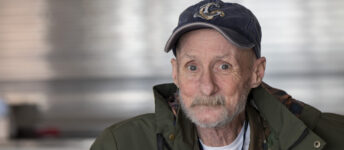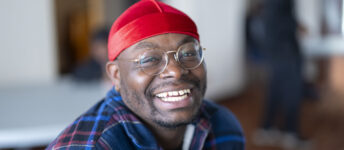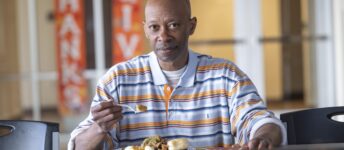Joel
“I Know I’ll Dance Again”
All Joel ever wanted to do is move to the music.
Born in Brooklyn and raised in Manhattan, the son of Puerto Rican parents was imbued with the beats of the city streets and the Latin rhythms of the Caribbean.
“I’m a dancer at heart,” Joel says. “I’ve always loved dancing, and I’m always looking at new dance moves. It’s what I do.”
But that love of dance took an unexpected blow a few years ago when Joel, then 46 and in good health, woke up one morning unable to move anything on the right side of his body.
“Just suddenly out of nowhere, boom, I woke up paralyzed!”
Thinking it would subside if he moved around, Joel worked his way to the bathroom and took a hot shower, only for things to worsen.
“I almost fell out of the bathroom,” he says. “I dragged myself back to my bedroom and called 9-1-1.”
When paramedics arrived, they assumed he’d had a stroke, and took him to the hospital. But after a battery of tests and four MRIs, Joel was diagnosed with multiple sclerosis.
He was stunned . . . and devastated.
“I had to learn to walk all over again,” he says. “I had to use a walker.”
Joel was unable to return to his job as a warehouse sanitizer, which had required him to be on his feet all day.
Suddenly unemployed, he was unable to pay his rent, and his landlord evicted him. Before moving to Virginia, Joel had experienced the semi-homeless life before, couch-surfing from house to house. He didn’t want to go back to that life.
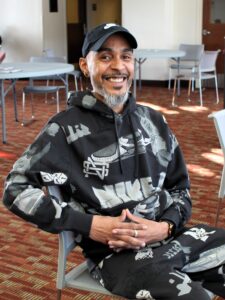 But Joel really didn’t want to go to a homeless shelter.
But Joel really didn’t want to go to a homeless shelter.
“My idea of a shelter wasn’t good. All I had in my head was this stigma.”
But then his cousin told him about a ministry he trusted. “I didn’t know what The Union Mission was like,” Joel says, but “I knew I had a situation that I needed some help.”
“They told me to be there the next morning by 9,” he says. “I was here at 8, waiting in front of those doors. I got in, and everything has been a blessing ever since.”
“I Grew up Too Quickly.”
For Joel, it’s been a long, hard road to find those blessings. He and his younger brother usually saw their dad only on weekends, and sometimes they stayed with his father’s loving mother “who took us to church all the time. I knew what the Bible was.”
But mostly, they were raised by a single mom, sometimes in dire poverty. There were bouts of homelessness when Joel’s family would sleep in abandoned buildings for weeks at a time. “We struggled,” he says. “I remember moving around a lot, but I don’t ever remember being hungry.”
Joel says, he “grew up too quickly” in those days, especially as a young teenager.
“I got caught up with a bad crowd. I dabbled in alcohol, marijuana, and cocaine. I lived fast when I was in New York.”
When finances got especially tight, Joel’s mom sent him and his brother to stay with her mother in Puerto Rico for a while. They hated the whole experience. Joel didn’t know this side of his family at all, and this grandmother treated the boys more sternly than their native cousins. His grandmother also practiced Santería, with religious rituals like sage burning and strange prayers to weird statues of saints to chase the bad spirits away. It gave him an uneasy feeling, especially at night. “That was witchcraft to me,” he says. “It was all evil.”
Plus, as Americans, they were teased, if not bullied, and they never fit in to the local culture. Joel couldn’t wait to get back to New York and familiar territory. In the meantime, he tried to toughen up and adjust to life in Puerto Rico. But “it didn’t take long until I got caught up with those drug addict people that was around me,” and Joel’s substance abuse spiraled out of control.
After a few years, Joel’s mom brought her boys back home to New York, and his drug dependency deepened. But in spite of that, as an adult Joel went on to hold several jobs, including work as a certified nursing assistant. He had three children and was married for a while, “but it didn’t last,” he says. His addictions didn’t help.
Joel eventually went into rehab and got involved with “the fellowship,” Narcotics Anonymous. He worked the 12 Steps and relapsed only a few times before he kicked his drug and alcohol addictions.
“Life is so good right now without all the drugs around me or in me.”
Joel was pleased to regain an unclouded mind, good judgment, and the ability to make wise choices again—and he’s now been clean and sober for more than 10 years. “I don’t need that in my life anymore!”
Life was looking up for Joel…till he woke up that morning, half his body paralyzed.
“I’ve Been Blessed.”
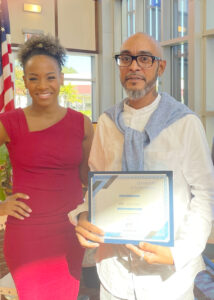 At the Mission, Joel has been a model shelter guest. He’s taken advantage of just about every class and program that his case manager recommended. “Whatever Rev. Evans asked of me, I did it because I know in the long run, it was going to benefit me.” He participated in workshops to overcome trauma and PTSD and to maintain good mental health when times get tough. Joel also found a brotherhood of positive, encouraging Christian support during his long wait for housing.
At the Mission, Joel has been a model shelter guest. He’s taken advantage of just about every class and program that his case manager recommended. “Whatever Rev. Evans asked of me, I did it because I know in the long run, it was going to benefit me.” He participated in workshops to overcome trauma and PTSD and to maintain good mental health when times get tough. Joel also found a brotherhood of positive, encouraging Christian support during his long wait for housing.
But Joel faced a major hurdle before he could move out—namely, his lack of income because of his medical condition. His MS qualified him to receive Social Security Disability Insurance, but the application process can be cumbersome and take a while. SSDI applicants are frequently turned down several times before they’re finally approved.
It was a godsend that an attorney with the Legal Aid Society of Eastern Virginia, one of the Mission’s resource partners, worked pro bono to assist him through the process. Still, he was turned down three times before he finally was approved for SSDI benefits. Joel was owed a couple years’ worth of back pay, so he received a nice lump sum. As soon as he received that check, he paid off debts, and put the rest aside to move into his own place.
With that steady income, Joel was able to leave the Mission’s emergency shelter program. He was selected for Norfolk’s Tenant-Based Rental Assistance—a H.U.D. subsidy program that makes up the difference between what a lower-income renter can afford and the actual rent for an apartment. Now his move-out is just weeks away.
“I see myself in my home.”
Joel’s also more mobile now than when he was first diagnosed. Though he still has weakness on his right side, and he tires easily, particularly on hot days, most of the time now he can walk without a cane.
It’s been a long time coming, but Joel says he’s more than ready to live on his own again. “I’ve been dying for my own apartment,” he says. “I just want to be comfortable and not have to worry anymore.”
He realizes his life with multiple sclerosis will remain “one step at a time,” but Joel will tell you he’s “been blessed.” His MS “has not been painful. Weakness, but no pain. It could have been 10 times worse. I can live with this.”
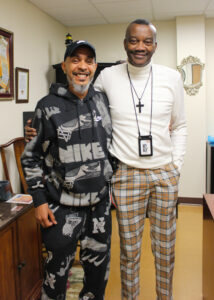 Joel is grateful for his time here. “If it wasn’t for The Union Mission, I don’t see it going well for me at all. I’ve seen how the caseworkers work. They’re about helping us…. Rev. Evans was here to help me. I just can’t thank him enough!”
Joel is grateful for his time here. “If it wasn’t for The Union Mission, I don’t see it going well for me at all. I’ve seen how the caseworkers work. They’re about helping us…. Rev. Evans was here to help me. I just can’t thank him enough!”
And with further improvement—and God’s help—Joel has great hopes for the future: to live independently, to buy a used car, to visit family or have them visit him.
“My faith has been strongest since I’ve been here, for sure. I have strong, strong faith!”
And despite the MS, he is not afraid to dream big: “I know I’m going to dance again,” he says. “I know I am! I’ve got a feeling.”
— Mark Moring with Cheryl Little for The Union Mission

